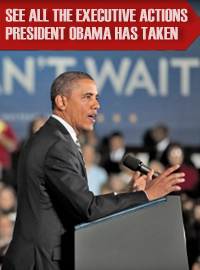| The Imperial Presidency Goes Green |
 |
|
By Troy Senik
Thursday, June 27 2013 |
Three words from Barack Obama’s presidency sum up the President’s casual relationship with constitutional law: “We can’t wait.” That was the tag line used as the theme for the White House’s policy agenda beginning back in the autumn of 2011. Had it simply been a rallying cry for the public to pressure members of Congress into action, it would have been perfectly within the mainstream of traditional American politics. Under Obama’s meaning, however, it was more threat than exhortation. The president was serving notice that he would act unilaterally when he didn’t get his way, separation of powers be damned. Thus did we get Obama’s almost comically unconstitutional recess appointments to the National Labor Relations Board and the Consumer Financial Protection Bureau (note to the White House: recess appointments require Congress to be in recess). Thus did we get an executive order enacting the DREAM Act’s prohibition on deporting certain illegal immigrants, despite the fact that the same measure had failed to achieve passage in Congress. And thus did we get Obama’s exercise in green autocracy earlier this week. In a speech delivered at Georgetown University on Tuesday, Obama announced that he is ordering the Environmental Protection Agency to begin crafting sweeping new regulations for reducing carbon emissions from coal power plants. Unlike previous proposals that only would have set standards for new plants, this new initiative will include existing plants as well, raising the prospect of enormous retrofitting costs. Needless to say, those costs will be passed on to consumers in the form of higher energy prices (a regressive tax if ever there was one) and to coal industry workers who will find themselves out of a job once the president is finished eviscerating their industry. Lest this seem like hyperbole, remember that Obama has never been particularly ambiguous about his hatred for the nation’s cheapest and most widespread source of electricity. During the 2008 presidential campaign, he famously told the San Francisco Chronicle’s editorial board that his preferred energy policy would see the cost of emitting carbon set so high that it necessarily pushes coal plants into bankruptcy. This was your redeemer president, America – a man who was publicly announcing his plans for industrial assassination. It’s hard to know which aspect of this new plan is the most galling. Is it the utter disregard for Congress and the American public? A Pew poll released earlier this week showed that 60 percent of Americans were unwilling to call global warming a major national threat. And Congress has already weighed in on the issue, shooting down Obama’s plans for a cap and trade program in the early years of his presidency despite the fact that his fellow Democrats controlled both houses of Congress. Part of the reason: A Treasury Department study at the time showed that passage of the bill would be tantamount to a 15 percent income tax increase. Is it the sneering contempt Obama demonstrated for those who disagree with him? In his remarks at Georgetown, Obama referred to climate change skeptics as “members of the flat earth society.” Never mind that the president’s professed devotion to science is decisively at odds with this refusal to brook critical inquiry. The facts of the issue give plenty of room for pause. Global temperatures have now been flat for a decade and a half. Indeed, as the German climate scientist Hans von Storch recently told Der Spiegel, “If things continue as they have been, in five years, at the latest, we will need to acknowledge that something is fundamentally wrong with our climate models. A 20-year pause in global warming does not occur in a single modeled scenario. But even today, we are finding it very difficult to reconcile actual temperature trends with our expectations.” Is it the blithe confidence that Obama can actually arrest climate change? Even if you accept the president’s diagnosis, it’s hard to put much faith in his cure. The United States is responsible for only 13 percent of global coal production. China and India, by contrast, are responsible for 55 percent. Even deep cuts in America’s carbon emissions would be little more than a drop in the bucket without international cooperation. Obama contends that he can get those nations to reverse course at the negotiating table. That notion – that developing nations will voluntarily repeal widespread industrialization if the President of the United States asks in just the right tone – should invite widespread skepticism. In the end, this carbon reduction push should be understood as a product of Obama’s failings. We likely wouldn’t be hearing about any big new domestic policy initiatives right now if it weren’t for the White House’s desire to shift the focus from the endless array of scandals that have dogged it in recent months. And we wouldn’t be subjected to another desperate display of executive power if the President had been able to convince Congress to support his proposals on the merits. This is the stink of desperation that sets in on second-term presidents. No longer facing reelection, Obama can attempt to defy public opinion and ignore the coal-producing states that he’d never dare confront when an election was on the line. Free of the political obligation to extend even token gestures of goodwill to the audience, he can dismiss the views of those who disagree with him with a wave of his hand rather than attempting to persuade the public. Having been blocked by the legislative branch, he can thumb his nose at lawmakers and dare the judiciary to rein him in. Never before has an imperial presidency looked so small. |
Related Articles : |
























